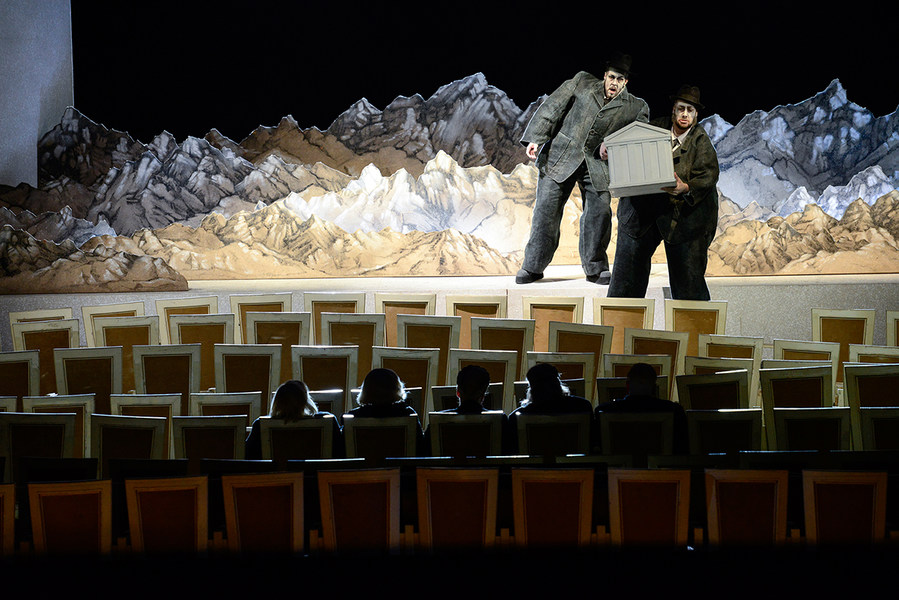Richard Wagner
Premiere 30. September 2001
Performed in German with German and English surtitles
Piece-Info
In the beginning, there was the idea: It was in 1848, while employed in Dresden as Royal Kapellmeister, that Richard Wagner came up with the idea for the Nibelung story, which he intended to turn into a heroic national opera. Eventually this early plan was transformed into the far more dramatically comprehensive »The Ring of the Nibelung« tetralogy, which was first performed in 1876. The Nibelung dwarf Alberich, by renouncing love, has successfully forged a ring from the mythical Rhine gold to secure his dominion over the world. Wotan, the ruler of the gods, wishes to use this gold to pay his debts to Fasolt and Fafner, who built Valhalla Castle for him. Just when Wotan’s plan seems destined to succeed, the robbed Alberich curses the ring. In his staging for the Semperoper, director Willy Decker interprets the story of the origin of the evil ring as the genesis of the world. He begins with Erda, the mother of the gods, who launches this tale of a theatre within a theatre ...
At the very beginning of the world, Erda is asleep. She is dreaming of the Rhinemaidens who with playful carefreeness guard the Rhinegold. The Nibelung Alberich interrupts their lighthearted game. He yearns for the love of the Rhinemaidens but they mock the dwarf. Foolishly naive, they reveal the secret of the gold which gives absolute power to anyone who renounces love and is thus able to forge the gold into a ring. Fury about love denied drives Alberich to undertake the desperate act: he steals the Rhinegold and renounces love in favour of absolute power.
Wotan is dreaming of a splendid everlasting life in Valhalla, the castle of the gods, which the giants Fasolt and Fafner have built for him. His wife Fricka is concemed about the price. Wotan has promised the giants the goddess Freia whose apples confer eternal youth. When the giants arrive and demand payment, Wotan refuses to relinquish Freia, thus breaking the agreements. The conflict threatens to escalate. Loge sees an alternative. He tells of Alberich who has forged the Rhinegold into a ring, thirsting to be master of the world with this instrument of power. Even now the Nibelungs are providing him with the most precious of treasures. This awakens the greediness of the giants who would be prepared to exchange Freia for the dwarf's gold. The gods too are fascinated by the concept of absolute power. Wotan accompanies Loge to Nibelheim.
In the depths of the earth, Alberich is controlling the Nibelungs with force and terror. He forces his own brother Mime to forge a magic helmet, the Tarnhelm, whose power only Alberich knows how to use. Wotan and Loge extract the secrets of the Rhinegold, Ring and Tarnhelm from Mime who is frightened beyond belief. Alberich too succumbs to the cunning Loge. Shamelessly flattering Alberich, he persuades him to demonstrate his power. With the help of the Tarnhelm, Alberich turns himself into a giant dragon and then into a toad. Wotan catches the toad and thus gains control of Alberich. To gain his release, Alberich has to hand over not only the gold but also the Ring to Wotan. He curses the Ring which will bring death to any future owner.
The gold of the Nibelungs does not suffice to release Freia. The giants also demand the Tarnhelm and the Ring but Wotan refuses to relinquish the Ring. Erda warns the god of the consequences of retaining the accursed Ring. Wotan gives it to the giants. Fafner and Fasolt quarrel over the distribution of the treasure. Fafner kills Fasolt and takes away the Ring and the hoard. The gods take possession of Valhalla. Only Loge knows that their pleasure will be shortlived. In vain, the Rhinemaidens ask the gods to return the Rhinegold to them.
Gallery
Das Rheingold















